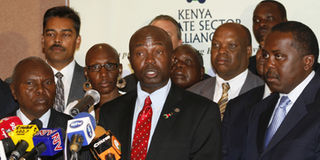Act exposes rifts in coalition

Kenya Private Sector Alliance deputy vice chairman Patrick Obath addresses the media on Wednesday. He urged Members of Parliament to reconsider the Communications Act when they reconvene the House. Photo/FREDRICK ONYANGO
The Kenya Communication (Amendment) Act 2008 has exposed the simmering differences between Grand Coalition partners, PNU and ODM.
From the onset, the anti-media law provided a vent for hard-line stands of the parties on matters which had been pushed to the rear in the spirit of the National Accord.
Dialogue
ODM argues that the law was rushed through the various stages during the period that the country was been served by a 17-member cabinet.
President Kibaki had announced the cabinet of PNU and ODM-K legislators in the midst of the national dialogue talks after chaos erupted following the disputed 2007 General Election.
On the other hand, key PNU members and its affiliate parties have been accused of pushing the president to agree to the bill despite outcry from the media, the public and other stakeholders.
This is after it has emerged that the President Kibaki had assented to the Bill despite a request from Prime Minister Raila Odinga that he does not do so until the contentious matters had been resolved.
Some PNU ministers and MPs had openly declared their support for the Bill, though many of them are now backtracking. The PM’s party thus believes that the rushing of the law has everything to do with the bungled 2007 presidential polls.
The party’s leadership has also revealed that it had also told Information Minister Samuel Poghisio that the law is retrogressive and was in need of amendments.
Mr Poghisio, an ODM-K member, went ahead and brought the Bill to Parliament defying calls by Mr Odinga to have the tabling deferred until proper consultations had been done.




